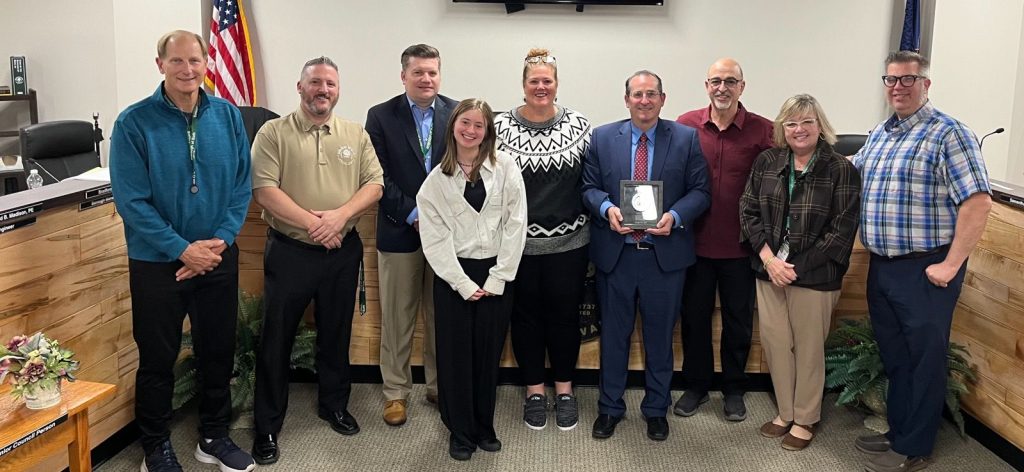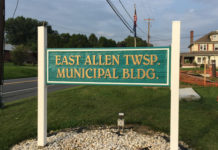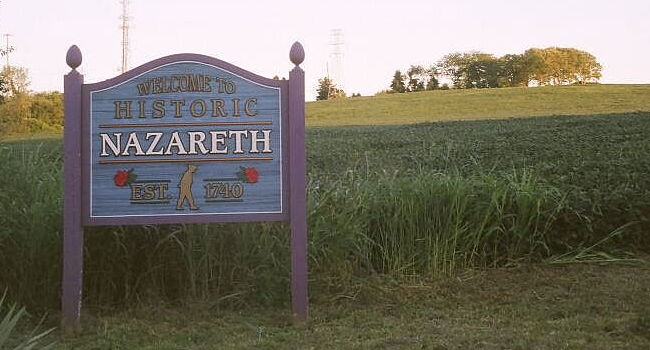
On Tuesday, Nov. 12, Bath Borough Council unanimously approved the adoption of the borough’s 2025 budget, maintaining the current 17.45 millage rate and ensuring no property tax increase for residents.
The 2025 budget includes a memorandum noting that while no property tax hike is planned, the Municipal Separate Storm Sewer System Fund is expected to issue its first Storm Water Utility fee within the first or second quarter of 2025. The utility fee will not be a tax but will cost the average homestead $80 to $100 per year and residents will have a full year to pay their bill. Once the fees are implemented, the borough will have an online portal available on their website for residents to conveniently pay their utility fee.
Moreover, council officially adopted the Stormwater Authority Ordinance and Articles of Incorporation during the meeting. The ordinance signifies the following: the organization of a municipal authority under the provisions of the Municipality Authorities Act to provide for stormwater system planning, management, and implementation; appointing and fixing the terms of the first members of the board of such authority; authorizing and directing proper officers of the authority to perform all acts and execute all other documents required or contemplated by this ordinance; setting forth and authorizing execution of articles of incorporation; authorizing all other necessary action; and repealing all inconsistent ordinances or parts thereof.
The Articles of Incorporation establishes the five appointed authority members and their terms and stipulate that the authority shall be in place for a standard term of 50 years, which can be extended in the future if there is new debt service issued for ongoing MS4 projects when the term ends.
Now that the ordinance has been adopted, the Articles of Incorporation will be submitted to the Department of State, who will then generate a certificate. Once the certificate is issued, the authority can then move forward with establishing a stormwater program lease/management agreement between the borough and the authority that governs the operations of the new entity.
The borough anticipates receiving the certification back from the state by January. Once it is received, the Storm Water Authority will be able to hold their first meeting to perform their duties such as establishing and implementing the borough’s Storm Water Utility fee structure and credit system. Until then, residents may attend the borough’s MS4 meetings if they have any questions, comments or concerns, which are held on the fourth Monday of the month at 5 p.m. in Borough Hall.
The MS4 projects currently planned will cost the borough approximately $800,000 and the utility bill to generate those funds will cost the average household $80 to $100 per year and will be based on impervious coverage.
As part of the state’s ongoing effort to reduce stormwater and waterway pollution, Bath is required to create a stormwater pollution prevention plan and implement effective management practices and projects to achieve a minimum 10% reduction in stormwater pollution by Dec. 31, 2027.
This mandate comes despite limited grant and funding opportunities to offset the associated costs, which is why the borough will need to implement a Storm Water Utility fee to pay for the MS4 projects.
Current pollution reduction initiatives include two dry extended detention basins on Holiday Hill, regular street sweeping and a rain garden at George Wolf Elementary School.
During a public subcommittee session on June 24, the borough discussed implementing a tiered structure for the Storm Water Utility fees, though details are still under development. Based on the proposed system, properties with less than 300 square feet of impervious coverage would pay $0, properties with 300–2,000 square feet would pay $20 per quarter ($80 annually), properties with 2,001–4,000 square feet would pay $25 per quarter ($100 annually) and properties with 4,001 square feet or more would pay $30 per quarter for every 2,000 square feet ($120 annually per 2,000 square feet).
A GIS database analysis shows Bath contains approximately 750 single-family residential parcels and 4.8 million square feet of impervious area. A sample analysis found that the average impervious area for single-family homes is 3,618 square feet, while non-residential and non-single-family parcels average 19,231 square feet per property.
To determine impervious coverage, aerial photography will be used. Property owners will also have the option to file appeals retroactively if they believe their assessment is incorrect.
Since Storm Water Utility fees are based on impervious coverage, tax-exempt entities such as schools, churches and nonprofits, which often have larger impervious areas, will not be exempt from the MS4 fee.
Additionally, the borough will provide credit considerations for residents who aid in water quality or other stormwater efforts on their property as an incentive for property owners to collaborate through partnerships and community projects that are also credited.
The credit program will utilize a formula to calculate credits based on the amount of each project’s pollution reduction or impervious coverage removal, which could be donated to other businesses or entities such as churches, nonprofits and schools to lower their stormwater fees.
Details of stormwater credits will be determined by the Bath Storm Water Authority.
For more details on the upcoming Storm Water Utility fee, visit the MS4 FAQs page on the borough’s website, bathborough.org.
In other news, council unanimously approved the following motions and resolutions: reappointment of Tony Kovalosky for another five-year term to the Bath Borough Water Authority; adoption of a resolution for the 2025 schedule of fees for the borough’s operations of administrations and committees and authorized the execution of the Old Forge Street Light Replacement to Solar Powered LEDs Project with Billitier Electric Inc. for $400,599, with construction beginning as early as Nov 18; conditional preliminary/final subdivision approval for the 450 N. Chestnut St. SALDO application; and approval of the 450 N. Chestnut St. Sewage Module DEP Resolution for plan revision for new land development.
Last, members of council said farewell to a longstanding team member, Solicitor James Kratz, who resigns from his post on Dec. 31 after 20 years serving the borough. Council presented Kratz with a crystal clock signifying his service.
“No person can ever question James’ steadfast commitment to the protection of our small borough. We find Bath in a better place now than when you first arrived here,” said President Frank Hesch.
“I appreciate everything you’ve done. You’ve become like family … and I wish you nothing but continued good health, happiness and all the best,” expressed Mayor Fiorella Mirabito.
“For nearly a decade of my career, your expertise, your dedication, your tenacity and unwavering commitment to the Borough of Bath has profoundly shaped our team and enriched our community. … You’ve been a steady source of support and guidance, always willing to lend an ear (even off the clock), offer advice or go the extra mile to ensure Bath’s success. Your ability to see the big picture while meticulously handling the finer details has been invaluable. Working with you has been an immense pleasure,” shared Borough Manager Bradford T. Flynn.
Although the presence and guidance of Kratz will be deeply missed by the borough, the newly appointed solicitor Patrick Armstrong will be taking over and will begin attending council meetings in December.
Bath Borough Council will meet next on Tuesday, Dec. 9 at 6 p.m. in Borough Hall, located at 121 S. Walnut St.








